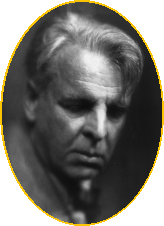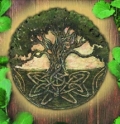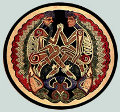Dubya Be
To W.B.Yeats; author of An Irish Airman Foresees his Death, Byzantium and The Second Coming.
 As a boy at school, I was imbued
As a boy at school, I was imbued
With some small, starting love of you.
On those few, most famous of your songs,
I gained some early practice at the art
Of taking songs of art apart;
To burrow to the roots of words,
Let meanings shift and thoughts converge,
To bring to light and render clear
A sense which seemed at first obscure.
The Irish Airman, to his cloudy tumult driven;
A modern mind seeking momentary solace from modern time,
Is held suspended in the gold and azure mirror
Of archaic, doomed Byzantium;
And the rough and slouching Beast, of stony Bethlehem,
Who´s dread inspired the terrible agendas of,
Of all our violent centuries, that most violent,
And seems today but all the more prescient,
As we stumble, mad and reeling, to a next,
That yet could prove the last, as some predict.
By such songs, and those of kindred scope,
In times that won´t admit to casual hope,
I learned that verses laid upon a page
Could hold the world, and all the details of its rage,
Conveyed by words before our single vision,
Quiet and still, for wordless contemplation
By an e´er enquiring heart.
And so, at end of middle life,
Having sought, for private pleasure,
Improvement in that art of which
You were so much more beyond mere master,
For best example, and dearest leisure, I thus acquired
The corpus of your works entire.
First time through, from front to back;
I was seeking patterns and reflections
That I had learned to love in other authors;
Startling twists and turns of phrase,
Images and similes, lustrous and exotic,
As those I had encountered in Rilke or Baudelaire;
Gems and nuggets,
Washed upon a friendly shore,
That I had just to bend and pick,
Then turn and trim in different lights,
To fashion settings and devices for my own avail.
But in your songs, read at such speed,
I found little to adapt to my own need.
Your images seemed more direct, less arresting somehow,
Less provocative of sparks on imagination´s obstinate anvil.
Though I loved at first hearing, I will confess,
Your ´dark leopards of the moon´.
And the meanings of your verses,
Too often seemed opaque, so perversely so,
I wondered if for its own sake.
Hurriedly re-reading some,
Still I could not fathom or unwind
Just who was saying what to whom, and
When what was being done to which.
Unrealising as yet, that it would take
A more absorbent and deliberate pace,
A hard and penetrating grace,
To find the sense concealed
Inside your measures.
 Somewhat relieved at having made
Somewhat relieved at having made
It to the final page, I reached
To relegate your book unto that highest shelf,
Where gather works that I respect,
But somehow doubt I love enough to read again.
But, of that moment, something stayed my hand.
Surely, something so acclaimed,
By so many critics whom I myself so much admire,
Must have some qualities that I had failed as yet to see?
I know that taste is fickle. Even good taste.
But can the best of all the mental world be wrong?
And so commenced my second reading.
This time around I read
But a handful of your songs each day.
Thus it became a journey of quite some weeks.
Among these days I would construct, here and there,
As routine would permit, little intervals of quiet,
Suitable for containing careful thought.
I then let each poem be its own work,
Desirous of its own time and place;
And patiently, I rehearsed its text,
Reading and re-reading, inwardly and silent;
Building up from word to clause,
From line to verse,
So on to full entirety,
Till I had found and unwound
The sensible gist of who or what,
Of why and when,
And then, and only then,
Did I read the verses out aloud,
With metre savoured, emphasis correct,
And proper intonation, in the best voice I could afford;
The beauty of the thing, made clear at last.
So many times then pleasure and admiration
Flooded in upon my mind, thereby made vast
The better to contain it.
The finest flower of art.
Thus completed, consummated,
I moved on to the next.
They call you modern,
But your images do not shock and jar so hard,
As is the modern custom. Your assonance
Does not tumble quite so fast,
With such disorienting intent,
As do my other modern favourites.
It´s what you do with little words
That marks your special mastery.
How you take the smallest particles,
And exercise their significance so hard,
Assembling them in lines and rhymes, about which
Multi-halo´d meanings cloud and cluster,
Clamouring for resolution into beauty,
And this beauty is your special music;
Concordant, gentle, strident or aching;
A shimmering semantic counterpoint
Of myriad subtle moods.
This love of little words, it seems to me,
Is like that of the Bard of bards, who,
Though centuries dead, his equal still to come,
And who has the smallest words that daily go unnoticed
Stand up, and beat on belly, brow or breast,
With impertinent freshness.
They call you modern,
But it does not seem to me quite so.
You commented on a modern, upturned age,
From without, ensconced within
The so beloved Celtic twilight,
That you crafted as you craved.
Which is where I hope you now do dwell,
Transfixed in endless, Faery days,
 Like Oisin, outside of glassy time.
Like Oisin, outside of glassy time.
Drinking from Love´s sweetest cup,
Whom you served as priest before,
And from her dark and bitter cup,
Whom you honoured all the more.
Copyright © John Ferngrove 2009

